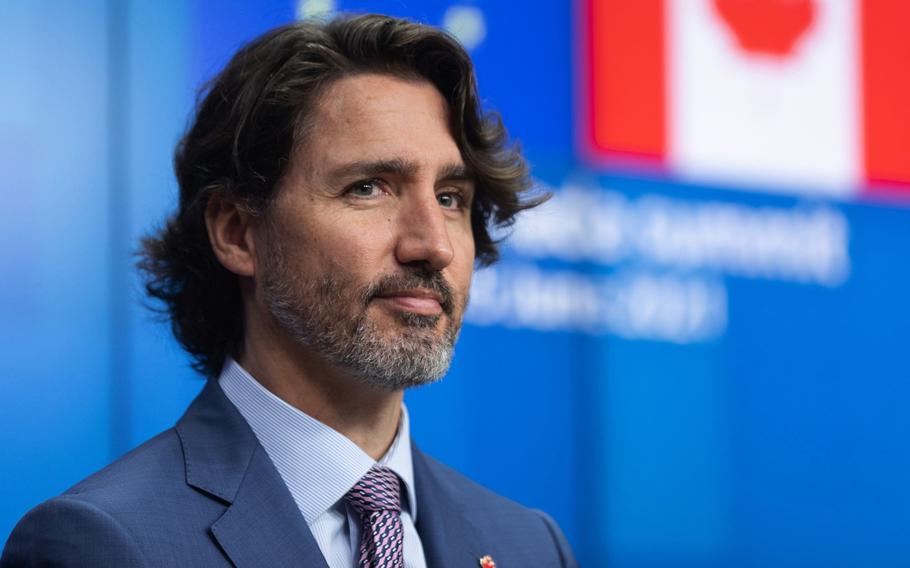Americas
US abortion decision ‘horrific’ and ‘appalling,’ world leaders say
The Washington Post June 25, 2022

Justin Trudeau, Canada’s prime minister, during a news conference in Brussels on June 15, 2021. Canadian Prime Minister Justin Trudeau also called the the Supreme Court’s decision to overturn Roe v. Wade “horrific,” saying that “no government, politician, or man should tell a woman what she can and cannot do with her body.” (Thierry Monasse/Bloomberg)
The Supreme Court’s decision Friday to overturn Roe v. Wade — and revoke the constitutional right to an abortion — has triggered widespread condemnation outside the United States.
World leaders and abortion rights advocates described the ruling as “horrific” and “appalling.” Crowds rallied in protest in cities including London, Paris and Edinburgh, Scotland.
“One of the darkest days for women’s rights in my lifetime,” Scottish leader Nicola Sturgeon wrote on Twitter just minutes after the decision came down.
Canadian Prime Minister Justin Trudeau also called the news “horrific,” saying that “no government, politician, or man should tell a woman what she can and cannot do with her body.”
“Abortion is a fundamental right for all women. It must be protected,” French President Emmanuel Macron wrote on Twitter. “I express my solidarity with the women whose freedoms are today challenged by the Supreme Court of the United States of America.”
The court voted 6 to 3 Friday to uphold a Mississippi law banning all abortions after 15 weeks of pregnancy. Five justices also voted to overturn Roe, upending nearly 50 years of legal precedent guaranteeing the right to the procedure.
The United States is now one of just three countries that have restricted abortion access in the 21st century. Over the past several decades, more than 50 countries have liberalized their abortion laws, according to the Center for Reproductive Rights, a global advocacy group opposed to abortion restrictions.
The United States is “out of step with the global community’s commitment to advance human rights,” more than 100 global health-care organizations said in a statement Friday.
In recent years, countries including Argentina, Colombia, Ireland and Mexico have all moved to expand abortion access. Mexico’s Supreme Court decriminalized abortion in a major ruling last September.
“Rarely have I been as proud to be part of the Mexican Supreme Court as I am today,” Chief Justice Arturo Zaldivar tweeted on Friday, in a clear allusion to the U.S. court decision. “All rights for all people. Until equality and dignity become customary.”
But the U.S. decision also alarmed advocates worried about its global effects.
“In 2018 the people of Ireland spoke loud and clear. Repealing one of the strictest abortion bans in the world. Giving Irish women their rights. We looked to America as an example of freedom,” Jennifer Cassidy, a former Irish diplomat and academic, wrote on Twitter.
Alvaro Bermejo, director general of the International Planned Parenthood Federation, said in a statement that the decision would embolden “other anti-abortion, anti-woman and anti-gender movements and [impact] other reproductive freedoms.”
Vickie Remoe, a writer from Sierra Leone, added that she was devastated by the decision, which she saw as “an attack on women period.”
“I am also worried about the far-reaching global implications this will have on access to safe abortions across the globe,” Remoe wrote in a tweet, “but especially in Africa.”
The decision did receive some prominent support outside of the country, including in Eastern Europe and Latin America.
The Vatican issued a statement that acknowledged the “heated debate” around the issue and said the U.S. decision would challenge “the whole world.” The head of the Catholic Church, which opposes abortion, called for “a non-ideological debate on the place that the protection of life has in a civil society.”
Some members of Europe’s far right voiced their approval. Beatrix von Storch, a senior member of Germany’s Alternative for Germany party, tweeted Friday that the decision was “good” and sent a signal of hope for unborn life.
“It will radiate to the entire West,” von Storch wrote.
Some political figures saw parallels to their own domestic battles.
In Brazil, antiabortion politicians celebrated the news from the United States. Just a day earlier, right-wing President Jair Bolsonaro expressed outrage that doctors performed an abortion on an 11-year-old girl pregnant with a child conceived by rape.
“The victory in the USA comes one day after the defeat we had, in Brazil, with the murder of an 11-year-old girl’s baby,” Carol De Toni, a federal deputy for Santa Catarina, wrote on Facebook. “May the civilizational advance that took place in the USA serve as an inspiration to Brazil and may we always save the lives of innocents.”
Also in Brazil, Debora Diniz, a professor of the law faculty at the University of Brasília, wrote on Twitter that it was a “day of great anguish for women, girls and all people in the United States.”
“My solidarity with all women, girls and others living in places in USA where abortion is now unsafe and criminalized,” she wrote.
- - -
The Washington Post’s Mary Beth Sheridan in Mexico City and Karla Adam and Annabelle Timsit in London contributed to this report.